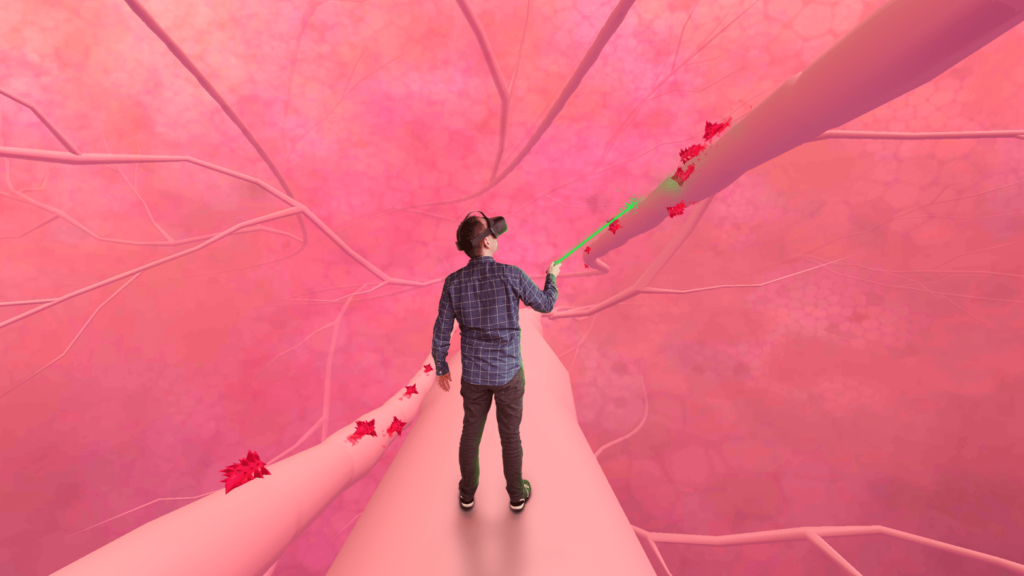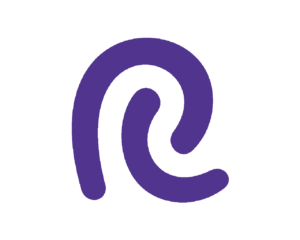Reducept is a virtual reality (VR) game, developed to combat chronic pain complaints. In the game, players go on a virtual journey through the nervous system. “Reducept trains the brain to decrease pain. To do this, we use scientific knowledge about virtual reality, pain education, and psychology. By combining these components intelligently, we developed our unique training!” states Louis Zantema, co-founder and GZ psychologist.
In the Netherlands, over 2 million people deal with chronic pain. Many people sleep poorly because of it, can no longer work, or cannot go without pain medication. These people have the need to regain control of their life and pain. The idea for Reducept was born in 2017, when initiators Louis Zantema and Margyt Fennema met. “Together with patients, we began to look for a fitting solution to this need. After trying many different intervention methods, a virtual reality game turned out to work the best.” Zantema says. The first year, development took place alongside their daily work. With limited initial subsidy monies, they developed the first prototypes and launched the first pilots. Zantema: “The first results were very positive and provided leads for further development of the prototypes. After that, we got down to business with the Medical Centrum Leeuwarden and various rehabilitation centres and psychologists in the Leeuwarden region. Patients and healthcare professionals have always been closely involved in the continued development.” Their startup took part in several accelerator and startup weekends, and eventually won them the Accenture European Health Tech Innovation Award 2019, the United Nations World Summit Award 2020, and two Serious Play awards.
The software development for Reducept was outsourced to an external developer, but was supervised closely in order to ensure the foundation of scientifically validated methods of pain management. Reducept also deliberately chose to seek out publicity during the developmental phase, in order to expand the support for the innovation. In this, experiences from the field took centre stage. Fuelled by investments from a VC fund, the supply chain and user instructions were finished, after which Reducept went live, in September 2019. By now, Reducept is used in over a hundred healthcare institutions in the Netherlands. Through a dashboard, practitioners can oversee different users and devices, and keep an eye on the different players’ accomplishments. However, seeing as only a small percentage of people with chronic pain are being treated, the goal of VR training has always been to be able to do it from home, on the sofa. That’s why the game is now also available to people who are not undergoing treatment.
The implementation of Reducept also had its challenges. Think of restrictive laws and regulations, or strict (and changing) regulatory requirements of the healthcare institute’s acquisition department. Zantema: “We made the decision to primarily focus on physiotherapy clinics for now. Here, too, they often treat chronic pain, but the decision about purchasing the product in this case often lies with one person, or only a few people.” Besides, the VR therapy is not yet reimbursed by healthcare insurers. Mostly because scientific proof of its effectiveness is needed for this. An RCT study has started by now, but the developments of the technology and therapy are progressing with such speed that the research results may already be outdated. “We see that healthcare institutes eventually invest in the application themselves in order to provide better care. It is our philosophy that reimbursements should not be a determining factor for an innovation’s success”, states Zantema.
Reducept has global ambitions. Seeing as only a pair of VR glasses is needed for the therapy, alongside Reducept’s software, it is relatively easy to scale up with collaborating partners. Meanwhile, XRHealth in the United States is offering Reducept’s software through their product. In the Netherlands, Reducept is working with the SyncVR Medical platform, which is also scaling up within the EU. “As Reducept, we deliberately choose distribution partners for our software, which allows us to stay focussed on the continued development of the therapy and other applications. It would be ideal if, in the future, there was a platform like Netflix where different VR applications can be used for different afflictions.”


